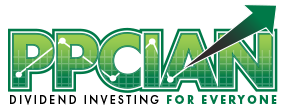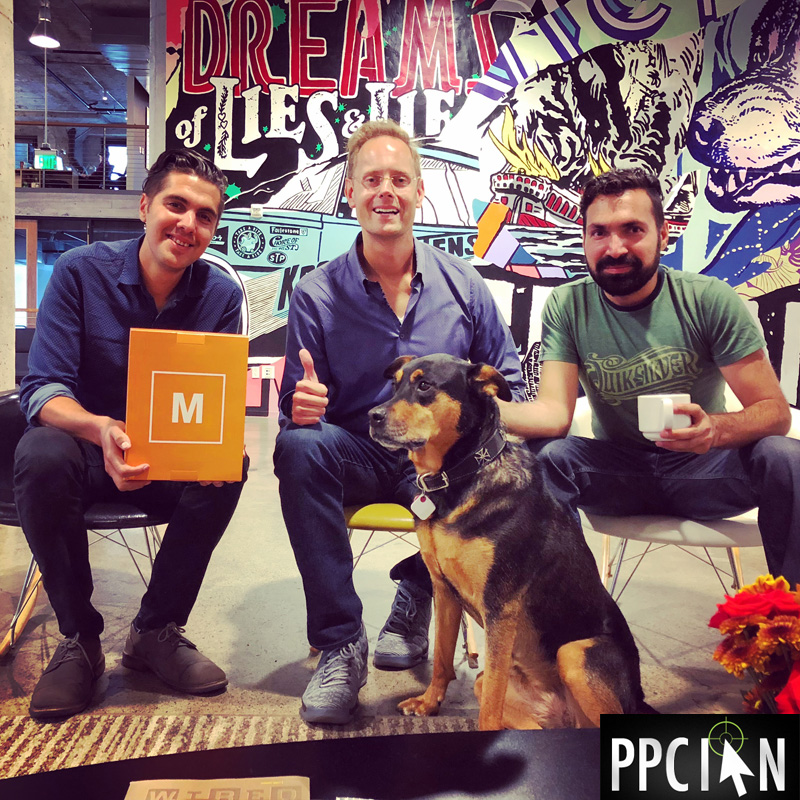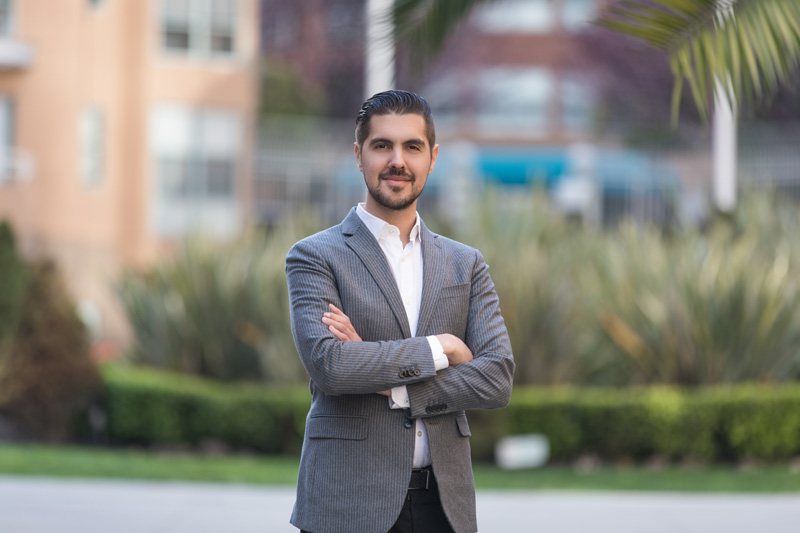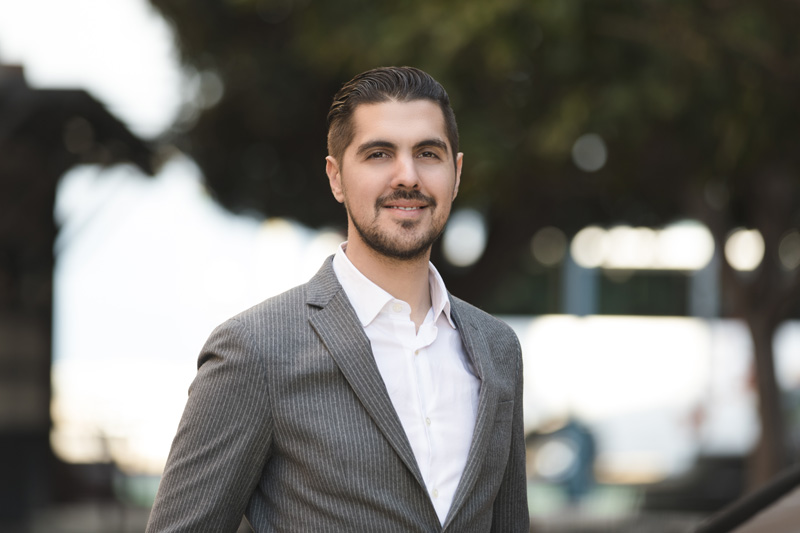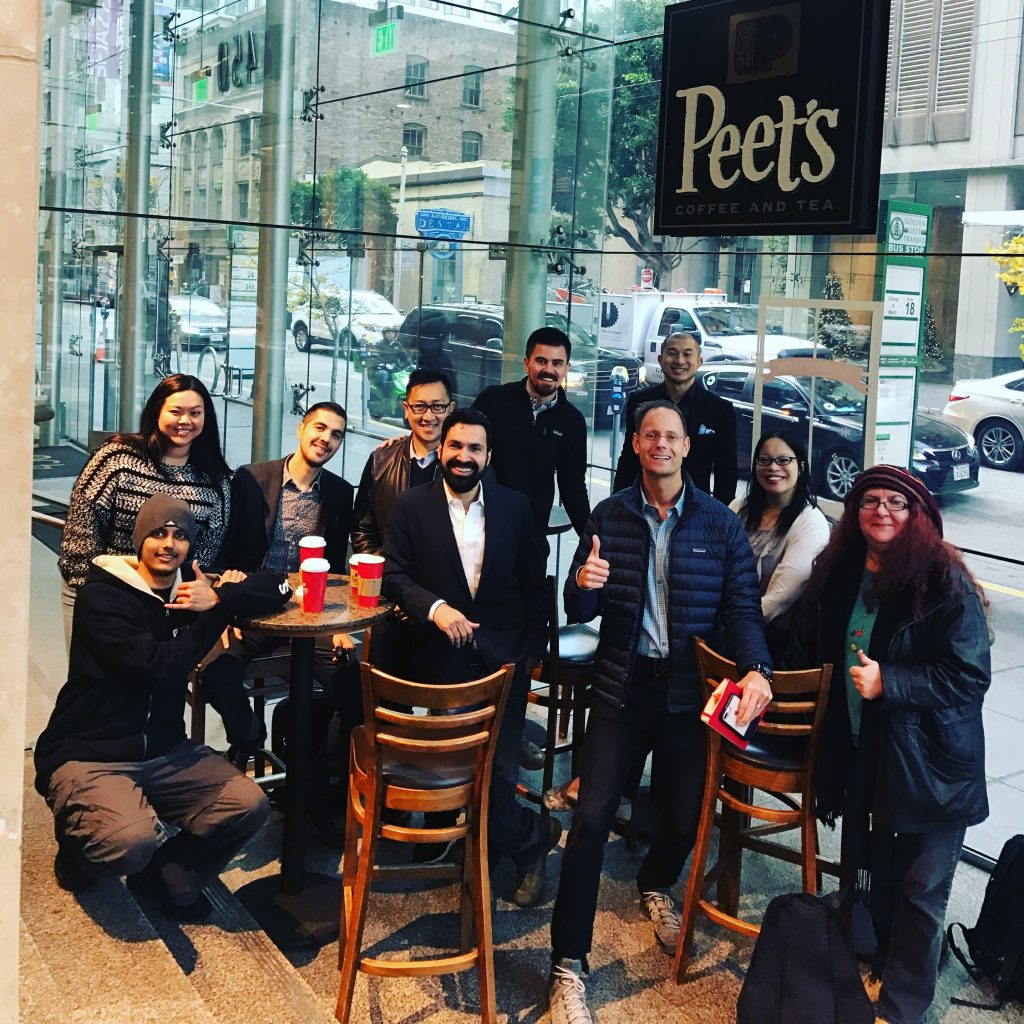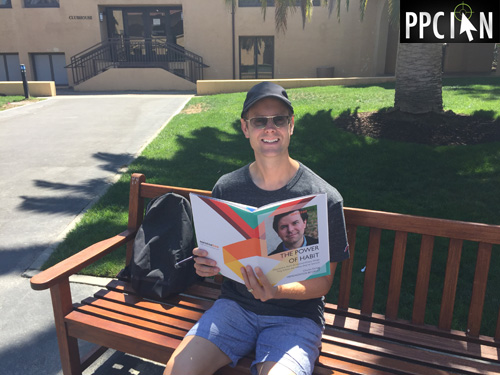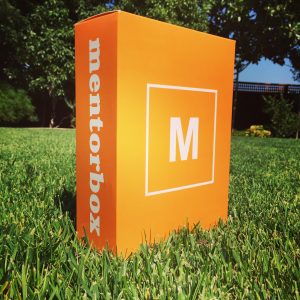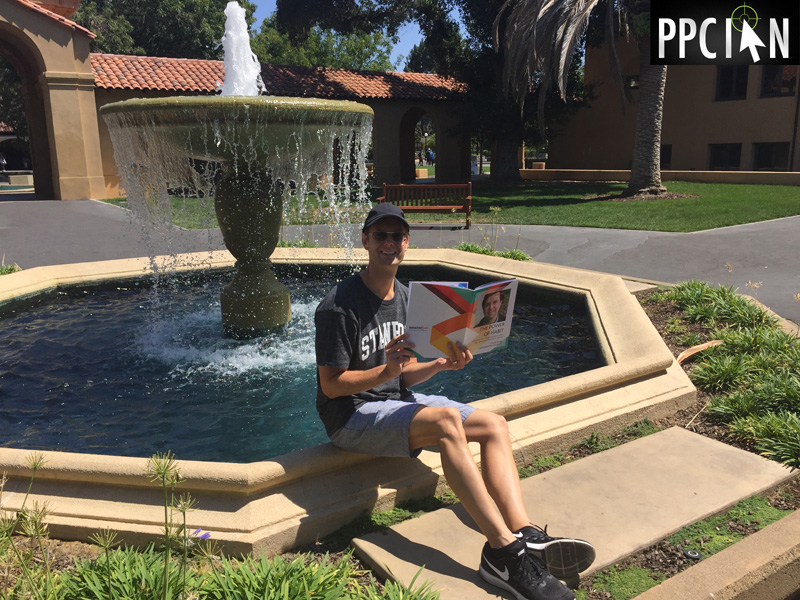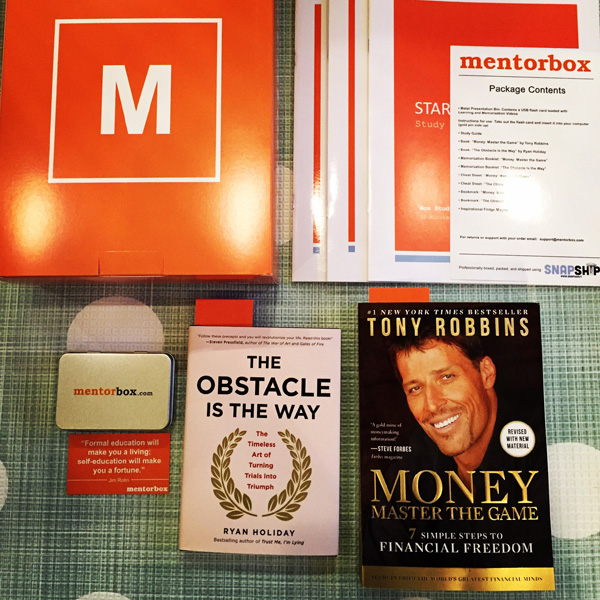If you’ve been reading PPC Ian for a while, you know that MentorBox is the platform I leverage to read, absorb, and take action upon two books per month! More than that, MentorBox is also a community of like-minded individuals who are all investing in themselves. Whether it’s via in-person meetups or the virtual Facebook Mastermind group, I always enjoy conversations with those in the MentorBox community.
Each MentorBox typically includes a bonus lesson workshop. One of the workshops about five or six months ago was all about reaching out. The workshop discussed the theory behind reaching out and how it’s powerful to simply reach out each and every day, to those connections who could take your business and life to the next level.This lesson helped me form a brand new habit, and I now routinely reach out to prospective connections. In fact, this lesson helped me land a mentor. It also helped me get in contact with both Alex Mehr, Ph.D. (Co-Founder and CEO of MentorBox) and Jonathon Kendall (COO of MentorBox).
It all started with an informal meeting and lunch, and my relationship with the MentorBox team has flourished ever since. (In fact, I have a variety of exciting updates that I’ll be sharing with all of you in 2018, as my collaboration with the MentorBox team is now at the next level!)
Today, because of reaching out, I have the opportunity and honor to interview Jonathon Kendall. One of the sharpest minds around and an incredibly successful entrepreneur and leader (at a young age), Jonathon’s story is sure to resonate with everyone here. His positivity, quest for knowledge, and ability to teach others is admirable. Without further ado, let’s give Jonathon Kendall a warm welcome!
Ian: Jonathon, thank you so incredibly much for being here today! Thank you for sharing your personal story, and the MentorBox story, with PPC Ian.
Jonathon: It’s a pleasure. Thank you for the opportunity.
Ian: As one of the main faces behind MentorBox, everyone who’s a customer knows you well. Your leadership and interview style is second to none. Before we get to MentorBox, however, I want to learn more about you, the leader, entrepreneur, and student. What was college like for you? How did you get started in business, Jonathon? How has your life story unfolded?
Jonathon: I’ve always been a bit obsessed with reaching for outrageous goals. I clearly remember religiously practicing sit-ups in order to break my grade school record. In middle school I trained (wrestling) at the Olympic Training Center in Colorado. In high school I competed at a national level in Speech & Debate. In college… You can see where this is going.
Gun to the head, the origin of all this was my mother telling me: "Jonathon. Where we live (Ohio), you will most likely be the darkest person in your class. And that’s okay. Good, even. But here’s the thing – if you do well – 'Jonathon' will do well. But if you screw up, it will be 'that Mexican' kid. So always remember, you not only represent yourself, but you represent your family: your grandma and grandpa who picked berries so that you would be able to live a better life, your sister, me and your father. What you do is not for you, it is for us."
My mother would say that the above exact wording is slightly off (the fishes are always bigger as the years pass, are they not?). Nonetheless, that’s how I remember it. My life has been a series of "proving myself" moments, that when aggregated, have resulted in my present position.
The details of my education are boring, I think. I read a lot of books. Went to college. Read more books. Etc. The difference (if there is a difference) is that I’m not-so-secretly obsessed with the meta-lessons of "learning how to learn", "habit formation", and "productivity", as much even, as I am with the hard-skills of marketing, product development, and management.
I’m almost allergically averse to "because that’s how it is." Like a physicist, I like unpacking everything all the way down as far as possible.
- Why are we here?
- What is right versus wrong?
- What should we do?
These are my questions. And towards their answers: this is where my education, hopefully, is taking me.
Does that answer your question? 😊
Ian: Incredibly fascinating answer, Jonathon. That certainly does! You clearly have a passion for reading, Jonathon. How did you get started reading? How has your passion evolved over the years?
Jonathon: The first book I ever read that knocked me on my ass was "Johnny Got His Gun" by Dalton Trumbo in 10th grade. I grew up in a family that valued education, but not so much reading. I know that sounds odd but this sentiment is common, I think.
"Get an education," parents say (while they watch television 5 hours a day).
…the consummate "do as I say, not as I do."
Alas, I didn’t grow up reading. I grew up being asked about my grades…but not about reading.
Nonetheless, sometimes it just takes the right book. The right idea. The right "aha" moment to wake us up from an intellectual slumber. For me, that was definitely Johnny Got His Gun.
It was banned. About war and death. About the efficacy of war. The definition of death. The importance of caring about what is actually important. It deconstructs honor, patriotism, the flag: the meaning of life.
Hence: "knocked me on my ass."
Thereafter I was hooked. Pretty much read everything I could get my hands on and still do. I’ve got through phases where I only read fiction, only read specific authors, only read non-fiction, only read philosophy, old books, contemporary, books about writing, books about books, short stories, and the longest novels ever written. The Russians. The Americans. The French.
Reading is like treasure hunting. Or gambling, even. Once you get that first big win…you’ll never stop looking.
There’s more to say, of course. There are books to deconstruct and theories to analyze. But reading doesn’t necessarily have to be complicated.
My reading motto is the same as Nike’s: just do it.
Ian: I really like that analogy of treasure hunting and finding big wins. Thank you so much for sharing. What are some of the greatest lessons you learned in your early (pre-MentorBox) days? What are the lessons that have helped shape your life strategy, and how did you learn these lessons?
Jonathon: After college I took a job with a startup in Guatemala that completely revolutionized my conception of reality. My mother says, "you came back a different person," and I trust her. Mothers know their sons.
In a word, what I learned was: gratitude.
The understanding that my life was cake. That my privilege, even though I came from a "poor" family, was profound. On account of my passport even. My native language. My education.
…profound.
I won’t get into the details because such platitudinal descriptions worship at the feet of actual experience. But suffice to say – it’s a whole different world down there. So much so, that it’s impossible for that frame not to permanently tattoo itself onto your psyche, forever.
Gratitude.
That’s the lesson which first changed my life.
Ian: While you’re now the COO of MentorBox, I was also incredibly impressed to learn that you were MentorBox’s first hire! How did you meet Alex Mehr, Ph.D., Co-Founder and CEO of MentorBox? How did you even find out about MentorBox at the time? A busy serial entrepreneur and leader, I have to imagine it was difficult to get Alex’s time (let alone land the job as his first employee). What did it take? (As a side note: Many readers here are career oriented, so I believe your response to this very question will be a game-changer for the audience.)
Jonathon: I wanted to be a writer before I was good enough to be a writer: a classic chicken or the egg dilemma of being an artist…
How does one practice writing full time (what it takes to become good), without getting paid for it (what it takes to live)? How does one play that paradox?
Well I took Tim Ferriss’ The 4 Hour Work Week to heart, and moved to Mexico in order to take advantage of the dollar-to-peso translation. I’d work for 4 months in the US, living like a hermetic popper, saving all my money, so that I could give myself off the other 8 months of the year.
I thought of it like an athlete would.
If I wanted to win ("win" meaning: get paid to write) then I’d have to consciously practice. I’d write every day for hours. Ask for feedback. Read everything I could get my hands on. Deconstruct. Analyze. Watch. Listen. I took every class I could find. Basically everything and anything in order to maximize my efficiency.
Which is what brought me into the world of self-development.
- Learning how to learn with Cal Newport and Barbara Oakley.
- Habit formation with Charles Duhigg.
- Motivation with Tony Robbins and Tim Grover.
- Etc. Etc.
And so I created a system for myself – a daily routine that would (I hoped) lead me to being a professional writer.
…which worked.
I eventually took on clients full time, ghostwriting books for business leaders and professional athletes. Which, full circle, lead me to MentorBox…
I was just finishing up with a client, when I saw an ad Alex placed, needing writers for this new company out of San Francisco: MentorBox.
The rest is history. From there Alex and I built MentorBox into a giant.
Ian: While I believe most readers here know about MentorBox since I’ve been talking about it quite a bit here on PPC Ian, could you please give a quick overview of your product? I think it would be helpful for the audience to get a summary of MentorBox directly from the source.
Jonathon: Some people stick with the status quo. They live their lives like hamsters in a wheel. And that’s fine. If you want to simply "maintain," then by all means go ahead. No judgement from me.
But if you want to become the best version of yourself (for you, your family, and community) then the science is unequivocal: you must obsessively continue to learn. You must stay on the cutting edge. You must evolve. You must pursue greater and greater goals.
Which…we know.
So that’s not the hard part. The hard part is the HOW.
HOW do I constantly improve? WHAT do I learn? And from WHOM?
These are much more complicated (albeit important questions) and MentorBox answers them for you. We teach you what you need to know, taught by the best in the world in every field, in an incredibly efficient/automated system.
Ian: Thanks, Jonathon. Since you started at MentorBox, your career has grown and evolved. You have taken on more responsibility. If you don’t mind me saying, you are one of the youngest COOs that I know and have experienced a very fast-paced career. What has been your secret? Can you offer the audience the career tips and insights that have propelled you to COO of one of the most amazing startups around?
Jonathon: I think of my professional career as would an athlete training for an Olympic gold medal. What are my competitors doing? What are they not doing? What can I do today to get 1% better? What else can I learn? How can I improve?
It takes a complete shattering of one’s ego to live like this. I understand this and know that it’s difficult. It’s much easier to guard yourself against criticism. But unless you want to rely on luck, which I don’t, this relentlessness is my trick.
One of my favorite definitions of success is this: "Successful people are willing to do what unsuccessful people are not." That, I think, sums it up quite nicely.
I’m where I am because I manifested my reality into existence.
Also…I may have gotten a little lucky too. 😊
Ian: I want to shift gears a little. I don’t know how you do it all, Jonathon. You read more books than anyone I know, you complete a multitude of interviews (and, believe me, I know how much work is involved to pull the off successfully), I understand that you like to run, and you have now taken an increased level of responsibility in the operations of MentorBox. On top of all of that, you have made it this far at a young age compared to most. What’s your time management secret? In life, sometimes it’s about the things you avoid. Anything you consciously avoid to keep focused and manage your time effectively?
Jonathon: I’ve created a bit of a forcefield around myself…
I have very few friends. I have very few activities I do or care about. I say NO to mostly everything. Which, I understand, is strange. But I think such laser focus is essential for creating an incredibly meaningful and fulfilling life: one which not only checks off the hedonistic boxes, but also is one that leaves a positive impact on the world.
- I doubt Edison was worried about the next happy hour.
- I can’t imagine Elon Musk feeling obligated to watch a television show.
- I don’t think Michael Phelps hung out with bozos.
I tell myself this all the time: "Guard your energy, Jonathon. Guard your energy."
Because, here’s the thing, people who accomplish incredible feats are by definition, strange. They are unique. And so…I don’t worry about shutting out everything else.
Noise is noise, I say. I’ve got better things to do.
So that’s step one: cut out distractions.
Step two is a modified version of what Gary Keller’s The One Thing promotes: create a daily success list and do those things first.
I mean, really, I hate to be a bummer – but none of this is all that hard. If everyone who is reading this just actually DID the things they knew that they should do every day – they would be years/decades ahead of where they are now. The trick is, yes, to set the right schedule. But deep down in your heart of hearts, most people know what that "should" is. They know the list. But…
They just don’t do it.
So, I guess, I’ve just built up a habit of setting a very specific agenda every morning based on where I’m currently at, and then actively checking off those boxes. If you do this every day, your life will change in a flash.
Ian: You seem to have a thirst for knowledge. You seem to be on a quest! In your MentorBox video interviews, it seems like you are always trying to pull back the layers of life to uncover meaning. Have you always had this thirst for knowledge? How does it feel right now? Have you discovered the truth, or does it feel like your studies are just beginning?
Jonathon: I used to think that I’d eventually find "the answer" but now I’m equally as convinced that I won’t ever find it. Meaning: I think one of the meta-rules of life is that "it all depends." The devil, as they say, is in the details.
Because even some ethical rule as benign as "be kind" is contextual. Sometimes being kind is not the answer. Sometimes people need hard love.
Or how about compassion? Sure, but isn’t there a line? Even as a society – can we unconditionally forgive everyone in all contexts?
That may not be completely articulate, but I guess my point is to say that no I don’t think there are any hard and fast rules. I have rules, granted, that I live by. But I’m not religiously or dogmatically aligned with them.
If I’m proven incorrect, then I’m proven incorrect. That’s fine. Good, even. I seek out such revelations. So too should everyone, I think.
Though, if you’re interested, my current life mantra is: choose to choose. As in, don’t be passive. Don’t be a zombie. Know why you do everything you do. Be conscious. Make decisions. Be a decider not a reactor.
"Choose to choose."
Ian: I love your "Choose to choose" mantra, Jonathon. Thank you for sharing that! You also have a strength in teaching others. You have this ability to take complex concepts from books and, with the help of your white board, teach the audience in plain and simple-to-understand terms. How did you learn to teach others? How has your teaching style evolved over the years?
Jonathon: Practice.
I know it sounds cliché but it’s true. In high school I competed in Speech & Debate. Then in college I competed in poetry slam. After university I worked as marketing manager, then as a waiter for a very long time…
All of this is communication.
Until when, now, it is literally my job to teach: so I just apply the same intensity to it as I do to all things. I teach a class as often as I can and ask for feedback from my team.
- How did I do?
- What did I do wrong?
- How can I do it better next time?
- What should I have said?
- Etc.
It’s not a from-the-sky gift, it’s that I’m obsessively and consciously trying to improve.
You can see that this is a theme by now. 😊
Ian: MentorBox keeps growing! Each and every day, I’m amazed at how quickly the MentorBox Facebook Mastermind group is growing. How has the product evolved since you started? Where do see MentorBox heading in the coming years?
Jonathon: I agree. It’s incredible. I’m so grateful every day for our growth. Truly…I tell the universe thank you every single day for our success.
It’s an honor and a privilege to teach our members.
As for the product: it began as a physical product and eventually evolved into the online platform we currently have. Now we also do consulting work, we hold monthly in-person roundtables, have started a marketing agency, and have cultivated an incredible VIP cohort as well.
We iterate quickly so depending upon when this is published we may have already moved on, but as of right now we’re translating MentorBox into Spanish for the Latin American market, and partnering with a few larger companies to fulfill their corporate L&D training for them.
Lots to do. Lots to learn.
Ian: MentorBox has changed my life for the better, without a doubt. That’s the reason I blog about it so much here on PPC Ian (and on my YouTube channel too). Any other success stories you’re able to share? I always enjoy hearing how others are growing and improving. Have any of your customers written in with their own MentorBox success stories?
Jonathon: One of my favorite stories is Tom Jones. He’s a professional endurance athlete and world champion kickboxer, who so persistently emailed our support team with praises, that we just had to meet him.
Like you (Ian), we eventually brought him in for a workshop called "Quit Proof."
Tom grew up in an abusive foster home and never had the opportunity to have a proper education. Never read, he said. "Just put one foot in front of the other." Which works for someone who ran across the US multiple times.
But there was always something lacking, he said. Until he became a MentorBox member…
The fact that we can touch the lives of unambiguously world-class performers, I think, is the reason why I love this story. To bring someone from negative to positive is one thing. To bring someone from good to great is amazing. But to take an elite world-champion performer to even greater heights: now that is truly special.
Ian: It all starts with a great culture. I truly see how Alex and you have fostered an incredible culture at MentorBox! Has this been a conscious decision? We have many folks reading who lead large teams (or even entire companies). Any tips for hiring, empowering, motivating, and growing employees?
Jonathon: I believe that everything in life is a fractal. Meaning: what works for an individual works for a couple works for a company works for a community works for a nation works for a world.
So (Extreme Ownership style) it starts and ends with Alex and I. How we behave is a guiding light for the rest of the team. If we take our mission seriously, so too will the team. If we value creativity and input, so too will the team. Etc. Etc.
So first off, my advice is to look in the mirror and get your own house in order before anything else. Clean your room. Exercise. Be kind. Think hard about why you do what you do. Align your values with your actions.
And then, and only then…
Will you be able to lead a team with any conviction.
After, it’s actually quite easy. Hire for strengths. Hire for values. Hire for energy. And be a human, not just a boss. The rest will take care of itself.
Ian: What’s your favorite book of all time and why?
Jonathon: The Obstacle Is the Way by Ryan Holiday (nonfiction) and On The Road by Jack Kerouac (fiction).
Ian: What quality do you most admire in great business leaders?
Jonathon: Purpose. I respect leaders who view that business is a tool, not an end.
Ian: The process of interviewing others on video is truly an art and skill. I know this first-hand, as a YouTuber. While my individual videos have been somewhat easy (they have improved over time, but they have generally come natural to me), I found that interview-style videos are a whole other ballgame. Can you offer any tips and strategies for those looking to get into the world of video (especially interviews)? How has your style evolved over time?
Jonathon: This applies to more than just interviewing but this is honestly the best advice I can give: overprepare.
Alex calls this bringing "overwhelming force."
When deconstructed, conversations are quite predictable. They start with breaking the ice, then move onto obvious surface level topics, then the two actors eventually drill down into maybe one topic, until finally, hopefully, reaching some meaningful endpoint "aha" moment conclusion.
You begin with "Hello my name is Ian, welcome to this edition of…" and you finish by talking about some personal detail of your life which hopefully illuminates a fundamental(ish) truth to life. Right? That’s how (good) interviews go.
So…if that’s the case. If we know that going into it. If we know that there is an equation. Why not bash the equation and get right into the good stuff as quickly as possible?
And the only way to do that…is to not ask the interviewee a series of banal predictable questions that no one cares about. And the only way to do that…is to earn their respect/trust as quickly as possible. And the only way to do that…is to show them that you took the time to dig in deep to their very personhood.
If you value them to begin with…they will reward you with trust…and that trust will manifest itself in the form of an incredible conversation.
In short: if you stay on the surface, so too will they.
Ian: I fun question for you, my friend. I personally found MentorBox via social media. (Your team’s social media marketing is second to none, by the way.) I was originally exposed to MentorBox via the Tai Lopez podcast (the other MentorBox co-founder along with Alex Mehr., Ph.D.). Then, I received ads promoting MentorBox on Facebook! Needless to say, I was immediately intrigued. I quickly signed up, and I think I’m one of your original customers from month two of the business. Alex, Tai, and your digital marketing team are true leaders in the social media marketing space. However, I have noticed that you personally take a different approach. And, I like that! You do not have as much of a presence out there on social media. Is there a reason for this? Is there a philosophy behind your lack of social media? Is it a time management thing? Would love to learn more about your strategy as it pertains to personal branding and social media marketing.
Jonathon: It’s a time management thing. Eventually I’ll probably take over the MentorBox branded social media accounts: teaching short lessons here and there. But for now (since Tai and Alex are already so powerful), it feels like a redundancy.
We look for paradigm shifts.
At some point, the micro optimization of me building out my own personal brand will completely make sense, but right now it’s unnecessarily redundant.
Ian: I truly believe that we all learn through challenge. Basically the words that Ryan Holiday shares in The Obstacle Is The Way truly resonate in the human experience, in my opinion. Have you faced any challenges in business and/or life? How have these challenges shaped you?
Jonathon: I think my biggest challenge was after I published my first book, The Evolution of Strangers. Before publishing, I thought "being published" was the answer to all my prayers. The clouds would part. Etc.
But that didn’t happen. In fact, many people told me the book was "well written" but boring and even a bit self-congratulatory. "Trying to be Kerouac." "You’re too young." "No one cares."
Which ultimately led me to fanatically pursue writing like an athlete.
So much so that I even lived in my car for months at a time, working 80 hours a week at seasonal restaurants, saving all the money I could so that I could take the rest of the year off to practice.
It was a bit of a self-imposed obstacle: but living in my car for three consecutive tourist seasons was a pretty intense decision.
Many of my friends didn’t understand at the time. But here I am. I knew what I was doing.
Choose to choose.
Ian: Where do you see yourself five years from now?
Jonathon: Oh man. I used to love that question but now I couldn’t tell you. I’m just focused on the next task at hand – ever reaching for that 1% better every day.
Though gun to the head: in five years I want to be embarrassed by who I am now. I want to have become such a better version of myself, that my present manifestation is but a ghost.
And as such: I don’t think it appropriate to let this now version of me, who still has so much to learn, decide on behalf of my future, better self. In five years I’ll let future Jonathon decide. He’ll know better, I’m sure.
Ian: Where do you see MentorBox five years from now?
Jonathon: A revolution.
Ian: Jonathon, I want to sincerely thank you for taking the time to connect with me and all of my PPC Ian readers today! It really means the world to us. I know you are a busy guy, and the knowledge you have shared is truly helpful and inspirational.
Jonathon: It was and is an honor.
Ian: If someone here at PPC Ian wants to learn more about MentorBox, what’s the best way to get started? As a related question, if someone here at PPC Ian wants to reach out to you, what’s the best channel for doing so?
Jonathon: The best way is to become a member and stay active on the mastermind group. It’s rare that I’m able to reply to direct messages since I receive so many these days, but I check the mastermind group every day.
Ian: Thanks again, my friend, for this interview and everything you and your team do to inspire. Wishing you all of the success in the world!
So there you have it everyone, I truly hope you enjoyed today’s interview with Jonathon Kendall, COO at MentorBox. Jonathon is an entrepreneur and leader to follow. His career has already flourished from the start, and I only see big things ahead for this leader. I am personally even more impressed with Jonathon post-interview than pre-interview. What an amazing story he has shared with us!
As you probably know by now, I love MentorBox, and I leverage this program to read two books per month. If you’d like to learn more, I encourage you to head on over to the MentorBox Website.
Also, if you’d like to see how a recent MentorBox book literally changed the game for me, you may want to check out my post covering My Favorite MentorBox Book So Far. Last, for those interested in seeing what it’s like to receive the physical MentorBox each month, I just uploaded a new video to YouTube featuring my very own MentorBox Unboxing.
Affiliate Disclosure: I am a MentorBox affiliate. If you purchase MentorBox via my affiliate link, I will earn a commission and be grateful for your support. That said, out of respect for the time and effort that Jonathon has invested in this interview, I have not included my affiliate link within the text of today’s interview. (I don’t want him compensating me for any new members/sales that may be generated directly from the hours he invested in sharing his insights and responses with everyone today.) The two text links to MentorBox within the text of this interview are non-affiliate links.
